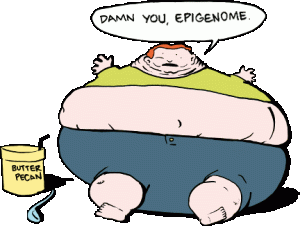Recent evidence suggests that some people may be able to blame being obese on their mother or grandmother (and not just being “big boned”). Studies conducted on mice have revealed that a mother’s diet during gestation may alter her offsprings’ epigenome, affecting their propensity towards obesity later in life.
 In mice, a gene known as agouti is associated with coat color, obesity, and the likelihood of developing diabetes and cancer. Rats whose agouti gene is unmethylated (i.e., expressed) have a yellow-ish coat color and are obese, while rats with a methylated gene have brown coats and are not overweight.
In mice, a gene known as agouti is associated with coat color, obesity, and the likelihood of developing diabetes and cancer. Rats whose agouti gene is unmethylated (i.e., expressed) have a yellow-ish coat color and are obese, while rats with a methylated gene have brown coats and are not overweight.
The Waterland Lab was able to show that the epigenetic status of the agouti gene was inherited by not just the mother’s offspring, but by her offsprings’ offspring as well. Importantly, they showed that supplementing the mother’s diet with foods rich in methyl groups silenced the agouti gene, resulting in offspring who were slender. On the other hand, the offspring from obese mothers who were not fed a methyl supplemented diet grew more obese with each passing generation. If these results are analogous to humans, it’s conceivable that a family history of obesity could be overridden by providing pregnant mothers with the proper dietary supplements.
Unfortunately, exposure to particular environmental toxins have been shown to result in unmethylated agouti genes and therefore obesity. Bisphenol A is a toxin commonly found in plastics (for example, it’s in many of the food or water containers that you probably have sitting around your house right now). The EU has had the good sense to ban its use, but it’s still found in many products sold in the USA. But I digress…
The Dolinoy Lab found that rat mothers fed bisphenol A produced yellow, obese offspring. I’d be interested in seeing if obesity rates in the past track with the use of bisphenol A in plastic products.
Fortunately, the Dolinoy Lab also found that diets rich in methyl groups (specifically, diets rich in soy products) could negate the effect of bisphenol A, resulting in slender, brown offspring.
It’d be interesting to consider if part of the reason that obesity rates in Asians lag behind those of most other ethnic groups is because of the large quantities of soy products found in their main cultural food staples. As Asian-Americans begin eating more and more typically American foods, we may see a generational increase in obesity rates.
In my mind, these studies stress the importance of keeping a close track of dietary intake while pregnant. As you probably know, obesity rates are on the rise and are associated with HUGE health care costs because of the slew of other health problems associated with obesity (diabetes, hypertension, etc.). Additionally, environmental toxins are unfortunately becoming somewhat ubiquitous and can apparently have the ability to exacerbate the obesity problem.
Fortunately, scientists have made great strides towards understanding how to manipulate diet to control epigenetic obesity risk factors. Hopefully this understanding will help us to reverse the current obesity trends.
—-
Dr. Dolinoy explains her epigenetics work in an audio slide-show found here.
—-
Since most of the people currently reading my blog have been redirected from SMBC, then many of you probably recognize Zach’s comic handiwork in this post. Thanks, Zach!

Excellent article, plenty of good quality info. I am going to point out to my friend and ask them the things they think.